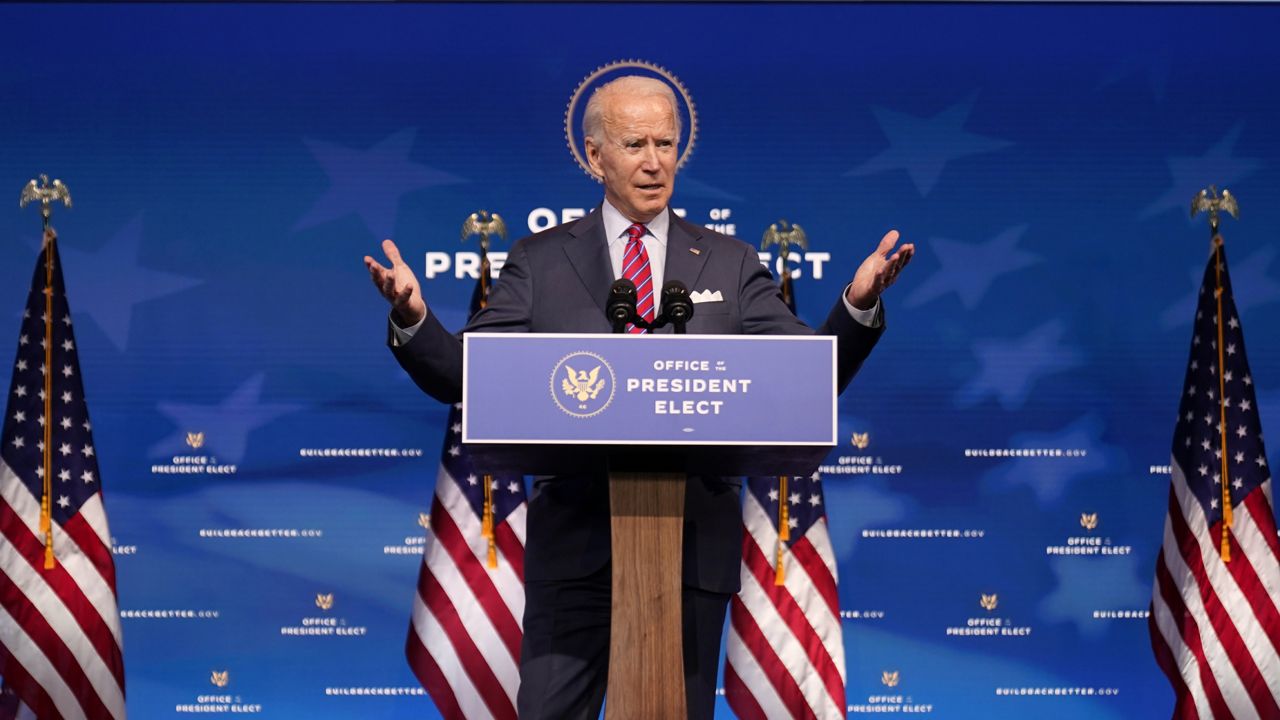President-elect Joe Biden on Friday expressed optimism about the future of a bipartisan COVID-19 relief bill introduced in Congress earlier this week, simultaneously warning that there will be dire consequences for the economy should the federal government fail to pass another relief package before the end of the year.
Biden has long maintained that addressing the COVID-19 pandemic will be the first step in economic recovery, a message he doubled down on during Friday’s speech.
“The situation is urgent. If we don’t act now, the future will be bleak,” Biden said. “Americans need help and they need it now, and they’ll need more come early next year. I am encouraged by the bipartisan efforts in the Senate around a $900 billion package of relief.”
A bipartisan group of lawmakers on Tuesday put forward a sweeping new stimulus package to address the COVID-19 pandemic, proposing $908 billion dollars in aid to help struggling Americans and their businesses.
The funding is broken down by “major issues” and allocated according to the cost estimate. For example, state, local, and tribal governments would receive $160 billion in funding under the plan; vaccine development programs would be allocated $16 billion, with support for small businesses — including the Paycheck Protection Program (PPP) — would receive $288 billion.
Notably, most Americans would not receive another direct payment under the proposed legislation.
The package cuts Democrats’ previous proposal of a $2 trillion-plus measure by more than half in hopes of breaking a monthslong logjam and delivering much-sought aid as the tempestuous congressional session speeds to a close.
And while Biden supports the new dressed-down package, he added Friday that “any package passed in the lame duck session is not enough. It’s just the start.”
“We’ll need more economic relief as a bridge through 2021 until both the pandemic and economic crises are over,” Biden added.
Biden’s address came on the heels of a monthly jobs report from the U.S. Department of Labor, which found that the economy added only 245,000 jobs in November — an indication that job growth has slowed for a fifth straight month in the face of the surging COVID-19 pandemic, showing just how much damage the resurgent coronavirus has caused.
During his address, Biden called the jobs report “grim,” saying: “It shows an economy that is stalling.”
“We remain in the midst of one of the worst economic and jobs crises in modern history. But it doesn’t have to stay that way,” Biden said. “If we act now, we can regain momentum and start to build for the future. There is no time to lose.”
But the fate of the bill remains up in the air. On Thursday, Senate Majority Leader Mitch McConnell said of the bill “compromise is within reach,” but has also maintained that his own $500 billion proposal is a better option.
When asked by reporters on Friday if Biden has spoken with McConnell since winning the presidential election, Biden refused to answer.
Instead, the president-elect said he believed McConnell would come around to the idea of passing additional COVID relief once Biden takes office.
"We'll be in dire trouble if we don't get cooperation. I believe we will," he said.
At the end of his address, Biden took questions on the federal government’s plan to distribute a COVID-19 vaccine should one be approved.
Having recently begun meeting with members of the current administration’s coronavirus task force, the president-elect said that while he “agrees with the priorities” laid out by the federal government — i.e., prioritizing getting the vaccine into the hands of at-risk Americans and first responders — he thinks there is “a lot more that has to be done” in respect to distribution planning.
“...There is no detailed plan, that we’ve seen, anyway, as to how you get the vaccine out of a container into an injection syringe and into somebody’s arm,” Biden said.
The president-elect also said he does not believe in making a vaccine mandatory for the American public, nor will he implement a nationwide mask mandate when he takes office in January.
Biden said Thursday that he will ask Americans to commit to 100 days of wearing masks as one of his first acts as president, stopping just short of the nationwide mandate he's pushed before to stop the spread of the coronavirus.
The president-elect has frequently emphasized mask-wearing as a “patriotic duty" and during the campaign floated the idea of instituting a nationwide mask mandate, which he later acknowledged would be beyond the ability of the president to enforce.
The Associated Press contributed to this report.



